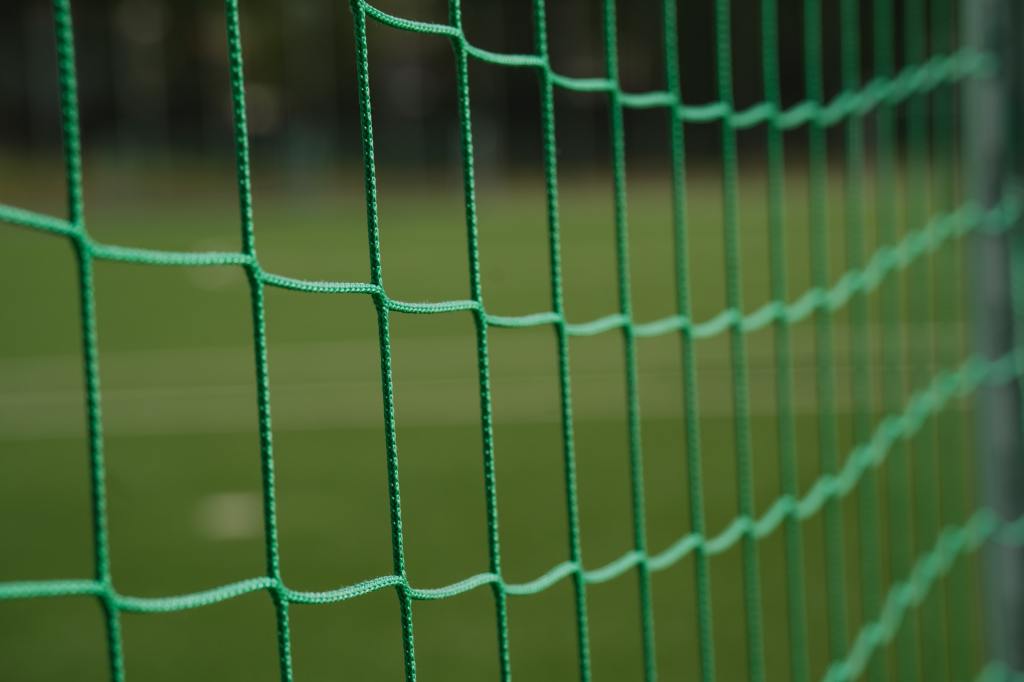Own-goal football
In a 1994 qualifying match for the Caribbean Cup, both Barbados and Grenada attempted to score deliberate own goals – because it was the best strategy available.
 Football net
Football net
Football has a lot of strange rules – like Ted Lasso, I still don’t understand exactly how the offside rule works. But the basic game is pretty simple: get the ball into your opponent’s goal, and prevent them from getting the ball into your goal. Scoring a goal against your own side is a rare and accidental embarrassment. Usually.
The qualification round for the 1994 Caribbean Cup had some unusual rules. No match could end in a draw; if the teams were tied at the end of regular time, they would go into sudden death extra time. But! Any goal scored in extra time would count as two goals. This was presumably done because this tournament, like many, used goal difference to break ties in the qualifying groups. (Goal difference = total number of goals they’ve scored minus the number of goals they’ve conceded.) So that extra time “golden goal” would give a team an edge in the overall competition. Little did the organisers know that it would also lead to one of the strangest football games ever seen.
The teams from Barbados, Grenada, and Puerto Rico were in a group together. They would play each other once. The team with the most wins would move on to the final tournament. If two teams were tied for the most wins, the goal difference would decide who would proceed.
Barbados lost to Puerto Rico, 0-1. Grenada beat Puerto Rico, 2-0. This set the stage for a bizarre match. Barbados needed to beat Grenada by at least two goals to advance. If they won by just one goal, or if Grenada beat them, Barbados would be out.
For the first 83 minutes, things were looking good for Barbados. They scored two goals, enough to secure both the win and the necessary goal difference to take them to the final tournament. But then, Grenada scored a goal. Barbados was only one goal ahead! In seven minutes, when the match ended, Barbados would win… but Grenada, with the superior goal difference, would advance to the finals instead.
So, what should Barbados do? The best option would be to score another goal, but Grenada had a strong defence and Barbados had no time to break it. Instead, Barbados did something unthinkable: they deliberately scored an own goal.
Incredibly, this was the optimal move. By tying up the game 2-2, they would force the match into extra time. One goal in extra time would give them both the win and (thanks to the double golden goal rule) the goal difference necessary to advance. Barbados had bought themselves a chance.
But! Grenada could also do the math. They quickly worked out that an own goal of their own would lose them the match (2-3) but let them go into the finals on goal difference. And, just as quickly, Barbados realised that they couldn’t let that happen – so they had to defend not only their own goal, but their opponents’ goal too!
For the final five minutes of regular time, fans were treated to a truly bizarre sight. Grenada was trying to score a goal in both directions: if they won or lost by one point, they would have the greater victory. And to stop them, Barbados was defending both goals at the same time – blocking both attempts at their goal, but also attempts by Grenada to score an own goal.
The outcome of this truly flabbergasting situation? Grenada did not get an own goal. The match went into extra time, and Barbados scored the (double) goal they needed to advance. Their own goal, and their defence against Grenada’s own goal, had won them the match.
[Thanks to Gareth E. and WeLoveKnowledge]
